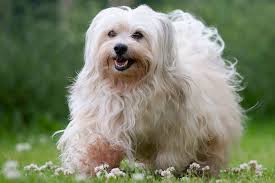
Havanese
Conditions of detention
Havanese dogs are highly adaptable and can live comfortably in both apartments and houses. They do well in urban settings as long as they receive regular exercise and mental stimulation.
Useful Fact: Havanese are ideal for city living due to their small size and minimal exercise needs compared to larger breeds.
Nutrition and diet
A balanced diet with high-quality dog food is essential for Havanese. Their diet should include a mix of proteins, fats, and carbohydrates to support their active and playful nature.
Useful Fact: Small breed-specific formulas can be beneficial, as they cater to the unique nutritional needs of smaller dogs.
Health
Havanese are generally healthy dogs, but they can be prone to specific health issues such as hip dysplasia, patellar luxation, and eye disorders. Regular veterinary check-ups are important to monitor their health.
Useful Fact: Dental hygiene is crucial for Havanese, as they are prone to dental issues. Regular brushing and dental check-ups are recommended.
Grooming and care
Havanese have a long, silky coat that requires regular grooming to prevent mats and tangles. Daily brushing and regular baths are essential to keep their coat in good condition.
Useful Fact: Many Havanese owners opt for a “puppy cut,” which makes grooming easier and keeps the dog cooler in warmer climates.
Education and training
Havanese are intelligent and eager to please, making them relatively easy to train. They respond well to positive reinforcement techniques such as treats and praise.
Useful Fact: Early socialization and obedience training are important to prevent behavioral issues and ensure they are well-mannered adults.
Toys and entertainment
Interactive toys and activities that challenge their intelligence and keep them active are ideal for Havanese. They enjoy games that involve problem-solving and agility.
Useful Fact: Puzzle toys and agility courses can keep them mentally stimulated and physically active, preventing boredom.
Safety
Ensuring a secure environment is important for Havanese, especially when they are outdoors. They are curious and may wander off if not properly supervised.
Useful Fact: A secure, fenced yard and supervision during outdoor playtime can help keep them safe.
Accessories
Havanese benefit from high-quality collars, leashes, and harnesses designed for small dogs. Proper identification tags and microchips are also important.
Useful Fact: Soft, comfortable beds and small-sized toys designed for toy breeds are ideal for their comfort and play.
Socialization
Early and consistent socialization helps Havanese become well-adjusted dogs. Exposing them to various people, animals, and environments is beneficial.
Useful Fact: Puppy classes and regular social outings can enhance their social skills and adaptability.
Travel and Transportation
Havanese travel well, especially if they are accustomed to car rides from a young age. They should be secured in a crate or with a seatbelt harness during travel.
Useful Fact: Their small size makes them easy to transport, and they can often accompany their owners on flights in the cabin.
Behavior and psychology
Havanese are known for their friendly, affectionate, and playful nature. They form strong bonds with their families and are protective yet gentle.
Useful Fact: Providing regular mental and physical stimulation helps maintain their positive behavior and overall well-being.
Legal aspects
There are no specific legal aspects concerning the ownership of Havanese, but it’s important to be aware of local leash laws and regulations regarding pet ownership.
Useful Fact: Ensuring your Havanese is registered and microchipped can help in case they ever get lost.


